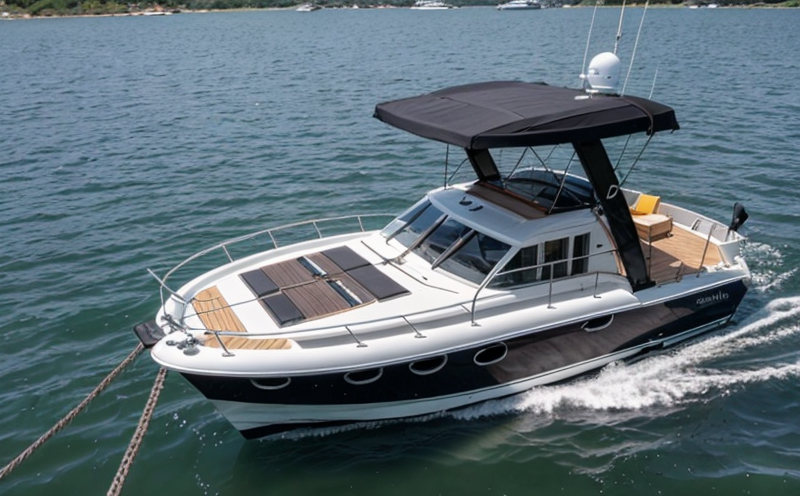ISO 7825 Load Holding Capacity Testing of Winches
The ISO 7825 standard specifies the requirements and methods for load holding capacity testing of winches used in marine environments. This service is critical for ensuring that mooring, anchoring, and deck equipment meets international standards and regulatory requirements.
Winches are essential components of maritime systems, providing the means to secure vessels safely against anchors or other mooring devices. The load holding capacity test ensures these winches can withstand extreme conditions without failure, thereby protecting both personnel and assets at sea. This service is a cornerstone for quality assurance in the marine sector.
The testing process involves subjecting the winch to specified loads that simulate real-world operational demands. These tests are conducted on-site or within our state-of-the-art laboratories using specialized equipment designed specifically for this purpose. Compliance with ISO 7825 ensures reliability and safety, which is paramount in a maritime setting.
For R&D engineers, understanding the performance characteristics under various loading conditions helps optimize design iterations. Quality managers can rely on these tests to ensure that their products meet not only local but also international standards. Compliance officers benefit from this service by ensuring they are adhering to all relevant regulations and guidelines.
The testing procedure involves several key steps:
- Initial inspection of the winch for any visible defects or damage.
- Calibration of the load cell used in the test to ensure accuracy.
- Suspension of the winch from a stable structure, allowing it to hang freely.
- Application of incremental loads up to 125% of the rated capacity specified by the manufacturer.
Throughout the test, precise measurements are taken using high-resolution load cells. Engineers monitor these readings closely to determine at what point the winch begins to slip or fail under increased loads. The goal is to identify any potential weaknesses in design that could lead to catastrophic failure during deployment.
The results from this testing provide valuable insights into how well a particular model of winch will perform in various scenarios, including heavy seas and strong winds. This information can be used by manufacturers to improve future designs or by buyers when selecting appropriate equipment for their needs.
Compliance with ISO 7825 is essential not only for meeting regulatory requirements but also for building trust among customers who rely on reliable maritime solutions. By adhering strictly to this standard, we ensure that every winch undergoes rigorous scrutiny before it reaches the market, guaranteeing its suitability and longevity.
It's important to note that while ISO 7825 provides a framework for conducting these tests, specific parameters may vary depending on the particular application. For instance, some applications might require additional environmental factors such as temperature or humidity considerations beyond those outlined in the standard.
In conclusion, ISO 7825 load holding capacity testing of winches is an indispensable part of maintaining high standards within the marine industry. It ensures that critical components like winches are capable of performing reliably under challenging conditions, thereby enhancing overall safety and operational efficiency on board vessels.
Eurolab Advantages
At Eurolab, we pride ourselves on offering unparalleled expertise in marine equipment testing. Our team of highly qualified professionals ensures that each test adheres strictly to international standards like ISO 7825.
We have dedicated facilities equipped with advanced instruments capable of simulating realistic conditions faced by winches at sea. This allows us to provide accurate and consistent results, which are crucial for maintaining product integrity and performance.
Our commitment extends beyond mere compliance; we go above and beyond to ensure our clients receive comprehensive reports that not only document test outcomes but also offer recommendations based on findings. This proactive approach enables continuous improvement in design processes.
We understand the importance of timely delivery, so all tests are carried out efficiently while maintaining quality standards. Our experienced staff works closely with customers throughout the process to ensure they have full visibility into every step taken during testing.
International Acceptance and Recognition
- The ISO 7825 standard is widely recognized across numerous countries around the world, including members of the International Organization for Standardization (ISO).
- This international acceptance means that tests conducted according to this standard are universally respected in maritime industries globally.
- Many governments and regulatory bodies have adopted ISO 7825 as a benchmark for evaluating marine equipment. Compliance with these standards enhances export opportunities and fosters better trade relations between nations.
The widespread adoption of this standard underscores its significance in ensuring consistent quality across different markets. It helps eliminate barriers to entry into new territories by providing assurance that products meet accepted benchmarks worldwide.
Competitive Advantage and Market Impact
By investing in ISO 7825 load holding capacity testing of winches, businesses gain several competitive advantages:
- Enhanced reputation: Adhering to globally recognized standards builds trust among clients and stakeholders.
- Increased market reach: Products that comply with international standards are more likely to attract buyers from diverse geographical locations.
- Better resource utilization: Accurate testing leads to improved product quality, reducing waste and increasing efficiency in manufacturing processes.
In today’s competitive environment where safety is paramount, compliance with ISO 7825 sets a benchmark that competitors must strive to achieve. Companies that prioritize this standard demonstrate their commitment to excellence, which can translate into higher customer satisfaction levels and long-term business success.





